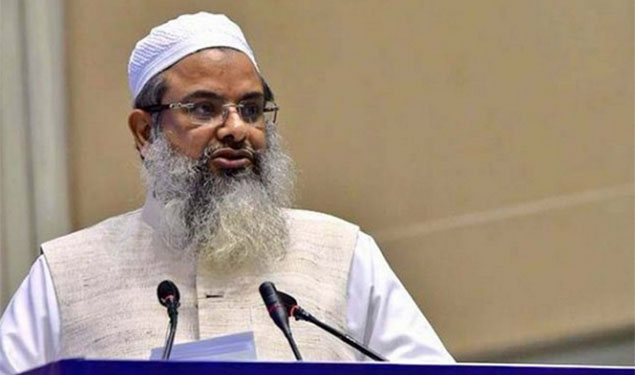– Mohd. Naushad Khan
A fresh controversy has erupted in Assam after the state government reportedly warned Maulana Mahmood Madani, President of Jamiat Ulama-i-Hind (JUH), that he could be sent to Bangladesh if he continued raising his voice against the state’s policies targeting minorities. The statement, widely seen as a political threat, has provoked sharp reactions from Jamiat leaders across the country, who described it as an insult not only to Madani but to the democratic ethos of India.
The controversy began after Madani strongly criticised the Assam government’s ongoing eviction drives, detention policies, and rhetoric against alleged “illegal migrants.” Addressing a public gathering last week, he accused the ruling dispensation of “deliberately painting Indian Muslims of Bengali origin as outsiders” in order to polarise society. In response, a senior Assam minister told the media that if Madani considered himself a sympathiser of Bangladeshis, “he might as well go there.”
The Jamiat Ulama-i-Hind, one of the oldest Muslim organisations in the country, hit back strongly. Its working committee issued a statement calling the Assam government’s words “outrageous, unconstitutional and a direct attack on freedom of expression.”
“Maulana Mahmood Madani is the son of this soil. His family has a long record of sacrifice for India’s freedom struggle. To ask him to ‘go to Bangladesh’ is an insult to the very idea of India,” said Maulana Hakimuddin Qasmi, General Secretary of Jamiat.
Leaders recalled that Madani’s grandfather, Maulana Hussain Ahmad Madani, was one of the tallest nationalist leaders who opposed the Partition of India and campaigned for Hindu-Muslim unity. “If such a family is being told to leave the country, what message is being sent to the 20 crore Muslims who are part and parcel of India’s fabric?” asked Qasmi.
The backdrop of this controversy lies in Assam’s fraught history with migration and identity politics. The state has witnessed decades of agitation over illegal immigration from Bangladesh. The National Register of Citizens (NRC), updated in 2019, left nearly 19 lakh people, Hindus and Muslims alike out of the list, raising fears of statelessness.
Since then, eviction drives in districts like Darrang, Goalpara and Hojai have displaced thousands, many of them poor Muslims of Bengali origin. While the government maintains these are “encroachments on government land,” human rights groups say the drives selectively target minorities without rehabilitation.
Madani has consistently criticised these actions, terming them “inhumane and unconstitutional.” His recent remarks in Assam, where he promised legal and moral support to the displaced families, appear to have triggered the government’s retaliation.
Across states, Jamiat leaders closed ranks in support of Madani. In Uttar Pradesh, Maulana Arshad Madani, his uncle and head of Darul Uloom Deoband, said the Assam government’s threat exposed its “communal agenda.”
“Those who fought against the British are being told to leave for Bangladesh. Meanwhile, the same government protects those who openly issue hate speeches. This selective nationalism cannot be accepted,” he said in a press briefing.
In Maharashtra, Jamiat’s state president Gulzar Azmi accused the Assam government of “criminalising dissent.” He noted that Madani had merely expressed humanitarian concern for displaced families, which is a constitutional right. “If raising your voice for the poor makes you a Bangladeshi, every justice-loving citizen of India should be ready to share that label,” Azmi said.
West Bengal Jamiat leaders also expressed solidarity. “We cannot remain silent spectators when elected representatives talk of banishing Indian citizens. We will organise nationwide protests if such rhetoric continues,” warned Siddiqullah Chowdhury, senior Jamiat figure in Kolkata.
Opposition parties too seized on the controversy. The Congress accused the BJP government in Assam of trying to “bully and silence” minority voices. Party spokesperson Shama Mohamed said, “Instead of addressing unemployment and inflation, BJP leaders are busy threatening respected clerics with deportation. This politics of intimidation must stop.”
The All India United Democratic Front (AIUDF), led by Maulana Badruddin Ajmal, went further, calling the threat “a fascist tactic.” Ajmal demanded an apology from the Assam government and warned that “targeting religious leaders will only deepen communal polarisation.”
However, Assam’s ruling BJP defended the minister’s remarks, insisting that the government was committed to protecting Assamese identity. A party spokesperson said: “If anyone supports illegal migrants, naturally they are siding with Bangladeshis. We cannot allow this. National interest comes first.”
The controversy has also drawn sharp criticism from academics and civil society activists. Sanjay Hazarika, an expert on North-East noted that such rhetoric “weakens the democratic debate” in Assam. “Migration is a complex issue, but threatening to deport Indian citizens particularly a religious leader with such a legacy only fuels alienation,” he said.
Human rights lawyer Vrinda Grover called the threat a violation of Article 19 of the Constitution, which guarantees free speech. “If leaders cannot critique government policy without being told to ‘leave the country,’ we are sliding towards authoritarianism,” she warned.
In a statement, Maulana Mahmood Madani himself brushed aside the threat but warned against its implications. “Neither I nor any Muslim of India has come from Bangladesh. We are sons and daughters of this land, with roots going back centuries. I will continue to raise my voice for justice, whether in Assam or elsewhere,” he said.
He appealed to his supporters to remain peaceful and not fall into provocation. “Our struggle is constitutional and democratic. We will not respond to hate with hate,” Madani emphasised.
The Assam government’s threat to Maulana Mahmood Madani has opened a new fault line in the already sensitive politics of migration and identity in the North-East. While the ruling dispensation insists it is protecting Assamese culture from “illegal infiltrators,” critics argue it is weaponising nationalism to silence dissent.
As the controversy deepens, one thing is clear, Madani’s stature as a national religious leader has ensured that the issue will not remain confined to Assam. With Jamiat Ulama-i-Hind and Opposition parties preparing to mount pressure, the government may soon find itself facing not only criticism in Assam but also a nationwide backlash over its rhetoric.




